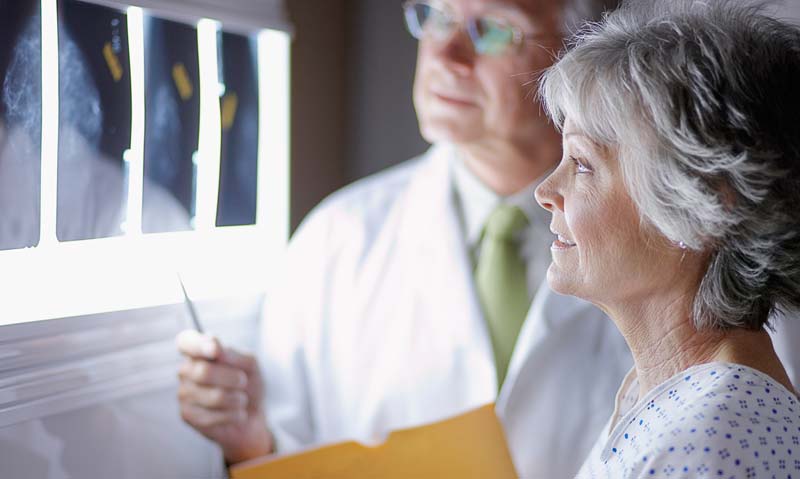INNOVATIVE approaches to cancer screening are essential to improve patient experiences and cancer detection rates, says a leading breast oncologist who introduced a streamlined protocol to reduce screening bottlenecks.
Professor John Boyages, director and professor of breast oncology at the Macquarie University Cancer Institute, said successful initiatives were already showing the importance of changing the breast cancer screening paradigm to meet patient needs.
These initiatives included the mammography-only StepDown protocol, introduced to reduce waiting times between an abnormal screening mammogram and follow-up assessment at BreastScreen NSW Sydney West, and projects like the department-store based Sunflower Clinics.
“Let’s not do the status quo for the next 20 years. Let’s build more Sunflower Clinics”, said Professor Boyages who is the former director of Westmead Breast Cancer Institute.
He said it was also time to provide more choice for women to undergo breast cancer screening. “Let a woman go to a local radiology practice with a breast screen form … the quality is good, the customer service is good, the access is good, the parking is good, I think [the federal government] should start funding private radiology practices to do [screening] and not be so precious.”
Professor Boyages’s comments came as an observational, prospective study of the StepDown service, which he coauthored, found no difference in the levels of psychological distress experienced by women attending the streamlined clinic and women attending standard assessment clinics. (1)
In the study, published in this week’s MJA, 136 women attending a mammogram-only StepDown service and 148 women attending standard assessment clinics reported moderate-to-low distress associated with their false-positive breast screen result 1 month after attending assessment.
“In both assessment groups, women had low worry about being diagnosed with breast cancer, low negative impact of the worry, and low anxiety about future mammographic results,” the researchers wrote.
Professor Boyages said that when the StepDown protocol was introduced in 2007 as a way to cut follow-up times that had far exceeded the required 28-day time frame, there was a lot of negativity about the approach and concern that it would increase patient distress.
“Women were distressed [about the delays], we had to do something, so we improved the manpower, we introduced StepDown assessment and finally got across the line a carefully implemented program”, he told MJA InSight, describing the study findings as “very exciting”.
The researchers said the StepDown protocol, with fewer diagnostic interventions conducted in a shorter time frame, had the potential to reduce patient distress. “That this did not occur highlights the challenge of reducing distress associated with recall, but is consistent with evidence that assessment is stressful for women regardless of the diagnostic investigations”, they wrote.
BreastScreen NSW state radiologist Associate Professor Warwick Lee also welcomed the findings, but said he was surprised the streamlined protocol did not reduce distress among patients.
“One of the reasons we like to limit the recall rates on women is because of the possible negative impact on women, mainly because of stress”, Professor Lee said. “It has been thought that distress was even worse if there is a prolonged period of time after screening.”
However, Professor Lee said the research indicated that patients understood that the majority of women presenting for complete assessment were found not to have cancer. “That’s a positive thing from the research”, he said.
It was noted in the MJA article that distress levels may have been slightly underestimated because some women said they were too distressed to participate in the study. The researchers also found that unease about attending future screening was generally associated with less willingness to return for screening.
Professor Lee said further work was needed to mitigate the negative effects of a false-positive recall.
The lead author of this week’s MJA study, Associate Professor Kerry Sherman, of Macquarie University’s Centre for Emotional Health, said there was a role for psycho-educational support for women whose distress may deter them from returning for future screening.
Professor Sherman, who is also a consultant researcher at Westmead Breast Cancer Institute, said breast cancer nurses and breast clinic counselling staff could help patients to reframe their approach to screening. “It’s really helping people to challenge some of the negative thoughts they have and focus on the positive aspects of being screened regularly”, she said, adding that highly avoidant patients may benefit from short-term therapy with a psychologist or a health professional trained in cognitive behavioural therapy.

 more_vert
more_vert
Subject: Catalyst CHOLESTEROL poked themselves in the eye
After criticising drug companies for selecting doctors who supported their products, THE CATALYST PROGRAMME DID EXACTLY THE SAME THING by selecting a group of individuals who supported their one-eyed view. I look forward to hearing the other side of the argument….but I won’t hold my breath waiting for the spin doctors at Catalyst to provide it!!